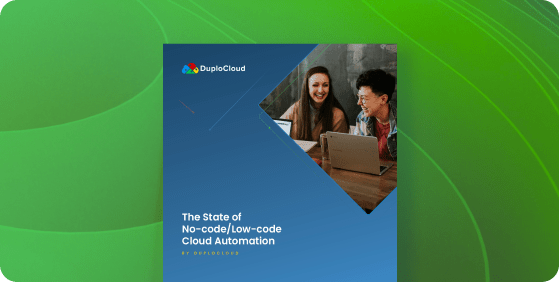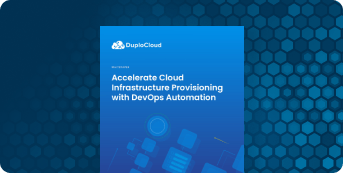Estimate costs and see how much you’ll save after transitioning to the cloud
Cloud computing platforms and services aren’t just for large, multinational conglomerates. Many startups can benefit from the speed, security, and accessibility the cloud provides. However, it’s worth doing a bit of investigation into how much cloud computing for startups typically costs before you transition will ensure you get the most significant impact from your budget. In this article, we’ll explore prices for common cloud computing services, how to estimate them, and the costs of other popular cloud-based services to round out your operations.
Jump to a section…
Benefits of Cloud Computing for Startups
Cloud Computing Costs for Startups
For All-around Development Work
For Productivity and Collaboration
Reduce Deployment Costs With DuploCloud
Benefits of Cloud Computing for Startups
Traditionally, businesses build their network services on-premises — that is, a company creates an on-site network that handles user access, processing, data storage, application use, file transfers, and other crucial tasks. These networks are comprised of bulky, expensive equipment which must be managed and maintained by internal IT staff, who handle everything from security to hardware upgrades and repair. On-premises networks offer much control but require dedicated teams of highly-skilled professionals to maintain and are difficult and expensive to scale.
Cloud computing transitions these crucial processes and components to external data centers, which provide necessary functions on demand. And whether your business moves to a cost-effective public cloud platform, a more secure private cloud solution, or opts for a hybrid system, it will find numerous benefits compared to on-premises network solutions. These benefits include:
- Data accessibility: Files stored on business intranets are only accessible from within the office network. This limits its availability to workers who may need to access crucial information outside of the office. And as more employees require remote access — whether they’re regularly working from home or need to check in on a project during downtime — making this information more widely available is crucial. Cloud computing solutions enable employees to access information and collaborate with coworkers no matter where they are.
- Scalability: Startups aren’t always small forever, and on-premises networks are difficult to scale without significant investment. With cloud computing solutions, companies can easily and rapidly scale operations to fit their data requirements — especially during irregular traffic fluctuations — while only paying for the services they need.
- Cost reduction: On-premises networks are expensive. They require complex webs of hardware and a dedicated staff to maintain operational efficiency — resources many startups don’t have access to. Cloud computing services offload these resources and provide access to necessary functions for a fraction of the cost.
- Data security: The most prominent cloud computing platforms offer state-of-the-art cybersecurity protocols to ensure that only authorized users can access sensitive data. Businesses can set automated user access policies to protect single files or entire directories. Plus, cloud computing solutions enable companies to recover data quickly after natural disasters or hardware failures.
When you’re ready to bring your business into the cloud, cover all your bases by downloading our free cloud migration checklist. You’ll find an easy-to-reference list of step-by-step instructions, ensuring your first migration stays on track.

Cloud Computing Costs for Startups
If you’re wondering what costs are incurred through cloud computing, the shortest answer is: It depends.
Cloud computing platforms offer a lot of services. You can use them to create virtual machines for building and testing products in various configurations. Storage services enable businesses to maintain and transfer important documents and other files. Teams can manage databases through the cloud. Or they can use a combination of these services (and more) to operate complex tasks entirely within the cloud.
The power of the cloud is that all of these services are pay-as-you-go. If you only need data storage, you pay a specific dollar amount per GB monthly. If you require the ability to set up virtual machines, you’ll pay a dollar amount per hour of use, per instance used. Other services may charge flat rates per user — it all depends on the service and what you need.
To start, it can help to know how much you’re currently spending on on-premises computing and storage. Use our helpful calculator to find out how much you spend and how much you can save by migrating to the cloud.
The following options are effective ways to start your journey into the cloud, along with the cost of cloud services for startups.
For All-around Development Work
Amazon Web Services (AWS) is an inexpensive yet robust platform offering a variety of cloud computing, storage, and database services. AWS provides a few ways to pay for its services:
- Pay-as-you-go: Simply choose what services you want and pay the requisite fee when you use them. Deactivate services when they’re no longer needed to save on cost. For example, an Amazon Elastic Compute Cloud (EC2) a1.medium instance (with one virtual CPU, 2GB of memory, and up to 10 Gigabit network performance) costs $0.0255 per hour, whereas Amazon’s S3 file storage buckets start at $0.023 per GB for the first 50 TB per month. Many services offer volume-based discounts, reducing the cost per unit when buying more of a particular service.
- Savings Plans and Reserved Instances: If you know the services you need and how much you need them, you can save money by making a one-year or three-year commitment upfront through AWS’ Savings Plan. Or reserve compute instances up front to save money on processing capacity.
AWS also offers a free tier for new users looking to explore their options. This tier includes free trials, offers that last for 12 months following the user sign-up date, and offers that are always free and available to every AWS user.
To understand what AWS will cost to meet your business needs, the service provides a pricing calculator to generate a monthly estimate for the total cost.
For Easy Data Storage
Dropbox is one of the most popular and user-friendly data storage solutions available, making it the go-to choice for startups when it comes to centralized storage and hassle-free file transfer to external parties. Startups needing only 5 TB of storage space can opt for the Standard subscription at $15 per user per month or gain unlimited space and large file delivery with the Advanced tier at $24 per user per month.
For Productivity and Collaboration
Google’s Workspace is a business-focused package of its cloud-based productivity services. Workspace provides a customized email address for your business, along with video conferencing tools with Google Meet, pooled storage through Google Drive, document creation software with Docs, Sheets, and Slides, and more. Subscriptions start at $6 per user per month (with a one-year commitment) and scale up for users that require more robust video conferencing and recording tools, greater storage capacity, and enhanced security features.
Reduce Deployment Costs With DuploCloud
Migrating and deploying to the cloud requires a significant investment in personnel, time, and resources — especially if you’re configuring infrastructure and security controls from scratch. DuploCloud can speed up this process and make working on the cloud more efficient. Its all-in-one DevOps Automation Platform automates infrastructure provisioning and orchestrates connections across your entire cloud-based operation with out-of-the-box security controls that map to PCI DSS, HIPAA, SOC 2, and other crucial security and regulatory standards. Plus, you’ll get continuous 24/7 monitoring of your entire network, alerting you to potential security risks ahead of time. Ready to learn more? Contact us today for a free demo.









